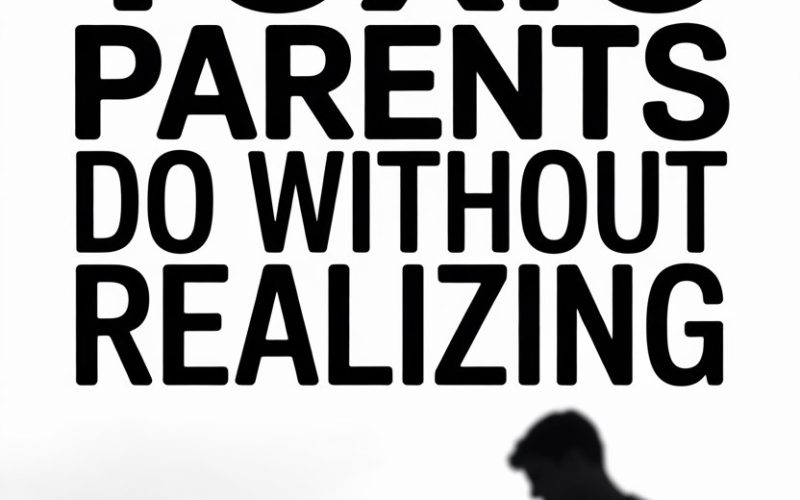Being a parent is a bit like performing open-heart surgery with oven mitts—you want to do your absolute best, but your hands are full, the instructions are missing, and someone’s always crying.
Nobody sets out to be a toxic parent, but even the most loving mums and dads can accidentally pick up a few habits that leave a mark.
Ready for a gentle but honest peek at some parenting pitfalls?
Here’s what might be happening in those wild, well-meant moments—plus some real-world fixes.
1. Criticising Instead of Coaching
Think about the last time you meant to help but ended up sounding a bit like a snarky judge on a reality TV show. “Why can’t you do anything right?” slips out when you meant to say “Let’s try that another way.” Oops.
Chronic criticism, even when disguised as ‘constructive feedback,’ wears kids down. They hear the negatives louder than the positives, and soon, even a small mistake feels like a disaster.
Experts at Child Mind Institute confirm that constant criticism chips away at self-esteem and makes kids anxious about trying new things.
Swap the running commentary for genuine encouragement. Instead of “That’s not how you do it,” try “I see you’re working hard—want a tip?” Every child needs a cheerleader, not a heckler.
2. Using Guilt as a Parenting Tool
It’s tempting, isn’t it? A sigh here, a “I guess you don’t care about your old mum,” there.
Guilt-tripping can feel effective, but it quietly teaches children that love is conditional.
They might comply in the short run, but research from the University of Michigan shows that guilt tactics often lead to anxiety, resentment, and a rocky relationship later on.
Instead, state your feelings honestly (“I’m really tired and would appreciate your help”) and encourage open conversations about needs and responsibilities. Turns out, honesty gets you further than martyrdom.
3. Dismissing Emotions
“Don’t be silly, that’s nothing to cry about.”
Sometimes even the most empathetic grown-up can fall into the trap of brushing off big feelings—especially when dinner’s burning and you’ve just stepped on LEGO.
Repeatedly telling kids to ‘toughen up’ or ‘stop being dramatic’ teaches them to bottle up feelings or feel ashamed of them.
The American Psychological Association points out that validating a child’s emotions helps them build resilience and emotional intelligence.
Try acknowledging the feeling first (“That was scary, wasn’t it?”) before moving to problem-solving. You’ll see more cooperation and fewer tantrums—eventually.
4. Withholding Affection When Upset
“Go to your room until you can behave,” followed by radio silence. Sound familiar?
Withdrawing affection or giving the cold shoulder when children misbehave seems like discipline. In reality, it leaves kids feeling unsafe and unsure if your love is only on offer when they’re ‘good.’
Parenting experts at Raising Children Network highlight that unconditional warmth—especially after conflict—teaches kids they’re loved, no matter what.
A calm “I love you, even when I’m not happy with your choices” goes a long way.
5. Oversharing Adult Problems
Telling your six-year-old about your boss’s rudeness or next month’s overdue power bill turns them into tiny, anxious therapists.
Children don’t have the tools (or the height) to solve adult woes. Psychologists at KidsHealth warn that this “parentification” heaps stress on young shoulders and robs them of a carefree childhood.
Need to vent? Phone a friend, scribble in a journal, or mutter in the shower. Your kids will thank you for letting them stay little.
6. Playing Favourites
You try to treat everyone fairly, but somehow the youngest gets away with murder, the eldest is your ‘responsible one,’ or you just bond a little more with the child who shares your love of football.
Children are expert detectives; they sniff out bias faster than you can say “But you got more mash last night!” A study in the Journal of Family Psychology found that perceived favouritism fuels rivalry, resentment, and long-term rifts between siblings.
Watch for patterns. Rotate who sits up front, shares chores, or picks the movie.
And if the kids call you out, listen—then course-correct, no matter how much you want to defend yourself.
7. Over-Control or Helicoptering
Hovering over every decision—homework, friendships, hobbies—seems loving. You’re just keeping them safe, right?
Yet constant micromanagement leaves kids anxious, dependent, and doubting their own abilities.
Harvard’s Center on the Developing Child says children need freedom to fail and flounder, with you cheering from the sidelines (and a metaphorical ice pack at the ready).
Try the “scaffold and step back” routine: offer help when they ask, then let them stumble and learn. Mistakes make marvellous teachers—and give you stories for their 21st.
8. Shaming in Public or Private
Maybe you’ve never posted “My child failed maths again!” on Facebook, but even sighing loudly at the shops or rolling your eyes in front of their friends counts. Shame is a toxic teacher.
Shaming focuses on the person (“You’re lazy!”) rather than the behaviour (“That wasn’t a great choice”).
This sinks into little psyches like cement boots, making mistakes seem like a character flaw, not a momentary blip. Studies in Child Development confirm that shame-based discipline leads to anxiety, aggression, or withdrawal.
Stick to addressing actions. Say “Leaving your shoes in the hall isn’t okay,” instead of “Why are you always so messy?” It’s a subtle tweak with a massive impact.
9. Setting Unrealistic Expectations
You want the best for your kids—who doesn’t? But expecting straight As, perfect manners, and prodigious violin skills (all before bedtime) only sets them up to feel chronically not good enough.
Research from Stanford University links unrelenting high expectations to anxiety, burnout, and even physical symptoms.
Ever met a nine-year-old with stress headaches? It’s not just the adults that feel the pressure.
Bring your expectations back down to earth. Aim for progress, not perfection.
Celebrate effort over outcome—praise the attempts, the grit, and yes, even the glorious failures.
10. Refusing to Apologize
If you’ve ever uttered the phrase “Because I said so!” or “I’m the parent, that’s why,” you’ve been there.
Parents are human, which means mistakes are inevitable.
But refusing to apologise—or acting like you’re always right—teaches kids that power matters more than kindness, and that grown-ups never mess up. Not the lesson anyone wants to pass on.
Family therapists at Psychology Today remind us that owning our blunders models humility, empathy, and accountability.
Next time you blow up over spilled juice or forget a promise, a simple “I’m sorry—I shouldn’t have shouted” works wonders.
The Antidote: Progress Over Perfection
Every parent has a few cringe-worthy moments stashed away. The goal isn’t spotless parenting; it’s being aware, making small tweaks, and forgiving yourself when you slip.
Kids don’t need perfect parents—they need ones who show up, admit mistakes, and try again (preferably with a cuppa in hand).
Noticing one of these habits in yourself? Congratulations—you’re already doing the hard part.
Awareness is the first step toward breaking a cycle. Pick just one of these tips, give it a go tonight, and watch your relationship with your kids soften and strengthen.
Parenthood: still messy, but a little more mindful.
Now, where’d those oven mitts get to?




